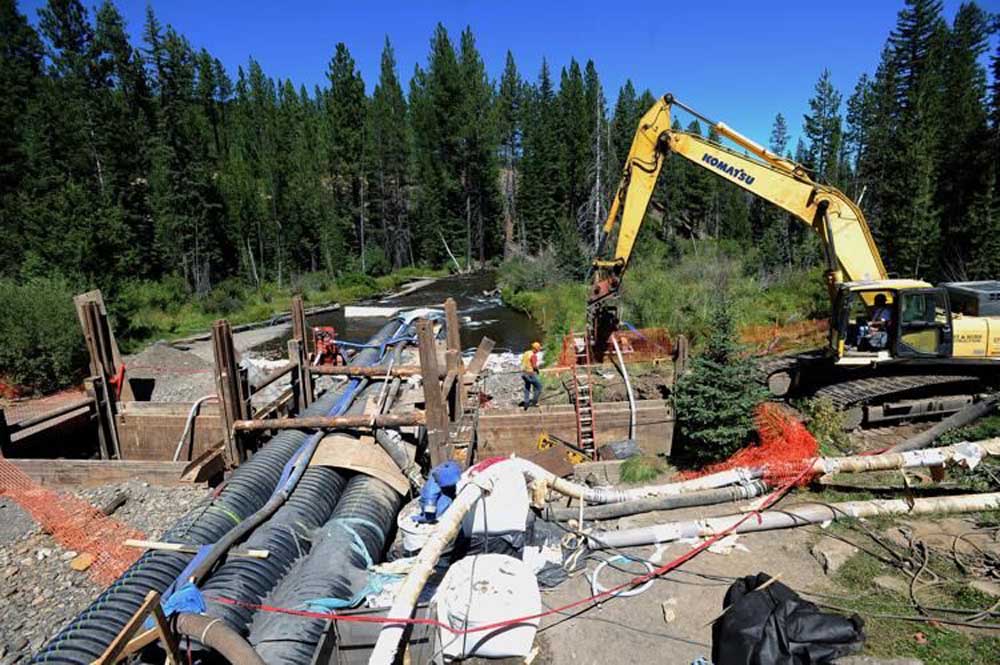Editorial: Should Bend install hydro in its water system?
Published 7:00 am Sunday, December 4, 2022

- A city contractor working to install the new Bridge Creek pipeline in 2015.
The 10 miles of pipe from the city of Bend’s Bridge Creek intake to the city’s water filtration system generates hundreds of pounds of water pressure.
Today, all that energy is bled off in a series of valves before the water is filtered and treated to protect Bend’s drinking water from giardia lamblia, cryptosporidium and much more.
Trending
There is potential to turn the untapped water pressure into electricity with in-pipe hydro. The Bend City Council is scheduled to decide Wednesday if the city should pay about $250,000 for a study to assess if hydro makes sense there and at other places in Bend’s water system.
It’s not a simple question. Yes, the original design of the surface water improvement project about 10 years ago did include hydro. Hydro was dropped along with some other parts of the initial project as a way to keep costs down.
There was also significant concern from some in the community that Bend would aim to take as much water as it could from Bridge Creek to keep a hydro operation generating maximum power, even if the city didn’t need the extra drinking water.
But the feasibility of hydro today comes with different costs, different incentives, subsidies, grants – and a different council.
The city does not know if hydro makes sense or where it would make sense, Brittany Barker, the city’s principal engineer, told us. Figuring that out will likely take a city contractor about six months. Austin Somhegyi, a city project engineer, did also point out in-pipe hydro could help the city meet goals for cleaner energy.
Next to monetary cost and benefit, the issue that will surely come up again is the issue of what it will mean for how much surface water Bend takes out of Bridge Creek.
Trending
That water is special water. Part of the reason it is prized for drinking water is that it is so good and so cold.
That also makes it precious for every drop that isn’t taken out of Bridge Creek and can flow into Tumalo Creek and then into the Deschutes River.
The city has water rights to about 18 cubic feet per second of water. Not a drop more. So would the city seek to keep its intake at the maximum or take even more to maximize its hydro revenue?
From talking to city staff during a tour of the water facility last week, we have to say we truly believe the answer is no. The first check is automated computer systems. Then there are the alarms that feed directly into the staff cellphones. Perhaps most important of all, there is Rod Mingus, the city’s water operations manager. He is not going to let that happen. He is committed to it. And if you meet him and hear him say that, we bet you would believe him, too.
It’s not wise to make generalizations but do you think this council or the slightly reshaped one that takes over next year is more interested in maximizing hydro revenue or reasonable hydro revenue along with the utmost concern for the environment?
There is another issue that will also be looked at in the study that may be overshadowed because of the focus on the hydro question. It’s prefiltration. Prefiltration was another thing removed from the surface water improvement project some 10 years ago, also to save money.
Right now, when the water comes down the pipe from Bridge Creek it hits the valves to stop it. It goes through pumps to get it up to the right speed again, it goes through some initial strainers and then passes through some fine membrane filtration that filters out things tinier than the width of a hair on your head.
The problem can be thunderstorms and other events that add debris to the water coming down the pipe. The worst would likely be a wildfire in the watershed. And that will almost inevitably come one day.
The city chose to go with a membrane filtration system to be able to handle particles. Some events will be so severe that the city will have to turn off its surface water system and rely on its wells.
Prefiltration would give the city’s water system more robustness — a greater likelihood that it could even operate even when a wildfire is adding so much turbidity to the water. How much might that cost? Would it be worth it?
There’s obviously critical aspect to cost and that is what would adding any hydro or prefiltration mean for ratepayers. The benefits may last for generations. What would it mean to your water bill?
In-pipe hydro and prefiltration have great potential benefits and unknown costs. The city is just starting to dig into these questions. If you have concerns, if you have input, you can reach councilors atcouncil@bendoregon.gov. There is more about the study the city may contract for on Wednesday at tinyurl.com/Bendhydrostudy.








